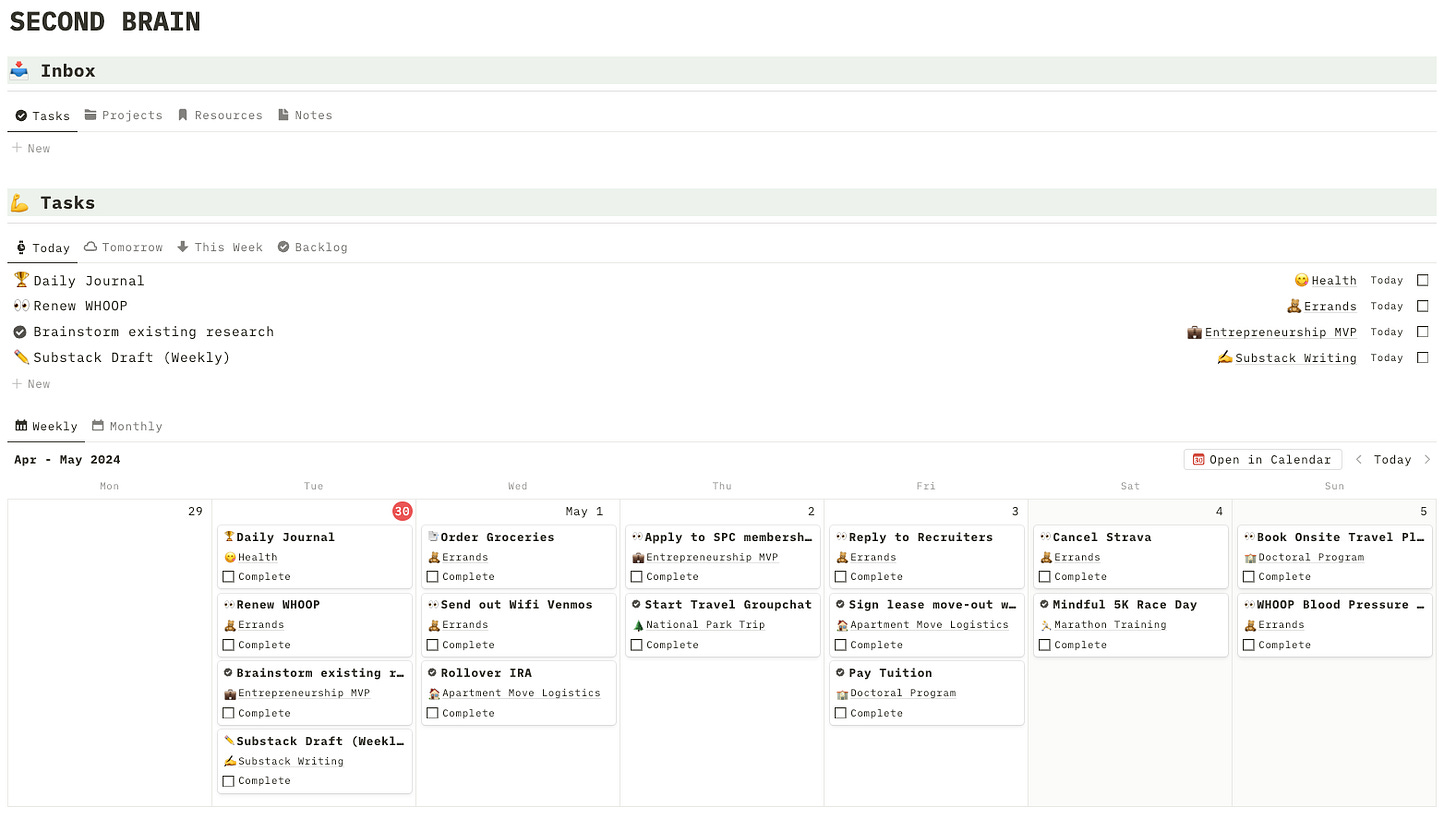I built a productivity dashboard to do less | Reflection | Day 15 / 100
Embracing Notion more, hopefully.
There’s a good chance you have been busy today, but does that always mean you’ve been accomplishing more?
We were taught to find systems that work for us to get things done, to learn quicker, to process more information. Remember the Cornell Note Taking System, or the Two-Minute Rule?
I’ve been fascinated by the idea of being more “efficient” in work and life for quite some time now. From the early days of Youtube, voiceover videos of random motivational speakers to modern tutorial videos on flexible systems of productivity. While I’ve continued to tweak my own system based on the newest trends to get more output, the results didn’t always speak for themselves.
It’s helpful to have your own way of tracking / reminding yourself of tasks and projects, but it might not always make sense to have a goal of finishing everything.
Here’s an example. I’m the guinea pig.
I followed a tutorial that taught me the basics of manipulating Notion databases and built a “Second Brain” page that stores my action items holistically (you can check it out here if interested; it follows the PARA method loosely). Here’s what parts of it looks like.
This dashboard intends to be a centralized place where all of your to-dos, notes, references and ideas can go. It allows for the flexibility of an “inbox” where items are scattered, and gives you free reign to assign it and categorize them later. For the tech folks out there, This is basically Jira and you are your own scrum master. Feel free to have a chuckle.
I find this a somewhat refreshing way of organizing, because you can seamlessly connect Notion to your browser for clippings / bookmarks, and you can also automate new tasks much like other reminder apps. The principle of having tiered systems of hierarchies like PARA is such that the owner can fully trust the system to note down anything they need to accomplish (instead of scattered in 5 different apps plus a notebook plus your brain), and in turn free their brains to be powerhouses for idea generation rather than memory storage.
Just one problem though. There’s too much random stuff we have to do, even for someone like me who’s not working currently.
With the reminders I’ve set up, my tasks will actually almost double than what appears in the calendar view as I go through the week. From a quick glance, just to complete these “mundane” tasks, it would probably take me a solid 10 hours or so a week.
What does this mean?
Making this little dashboard while I’m not working revealed an interesting hypothesis: maybe we’re not supposed to get everything done.
Not a new idea by any stretch obviously and you can find whole books written on it (The 4-Hour Workweek is a prominent example).
But what I didn’t realize is that we probably can all benefit from being more aggressive about it than we currently do.
Even if a Notion dashboard can alleviate the mental burden of holding in your shoulds’ and musts’ of the week, the mere act of running through tasks that you decided on such as planning that summer getaway or just keeping the lights on with laundries and groceries can take a meaningful chunk of your time.
Though unfortunately, we don’t all have personal assistants and the luxury to buy our way out of this.
Fortunately, some of these activities leave your refreshed like a clean load of fresh clothes and are good mental resets.
So what can we do to prevent life from running us and run it instead?
Do less.
Doing less is basically “prioritization”, a word we throw around in corporate environments on a sometimes-more-than-daily basis. I believe the context is different when it comes to ourselves versus just work, and as a result, it will not always mean your work laptop or side business.
It’s entirely dependent on what you want today, this week, and up to years from now.
This means that even if I have two important meetings the next week, I might want to prioritize planning that dinner date with my girlfriend, or take a long long walk outside to get some fresh air. Because the value of long-term relationships and my own ability to deal with anxiety trumps that of a potential customer / job / opportunity.
Unfortunately this also means it takes a bit of thought to decide what’s worth pursuing today given a stack of to-do’s. And to make matters worse, a lot of things come with deadlines when our world runs on Benjamin Franklins.
But just maybe, our P0 assignment at work today is less important than that doctor’s checkup we’ve been avoiding making an appointment for. Jobs are always there, but today won’t happen again.
The next time we’re about to run through a list of to-dos with “traditional” priorities, we could try a simple question:
Will this next task add the most value to my life holistically, compared to the other tasks?
JZ, April 30, 2024.




